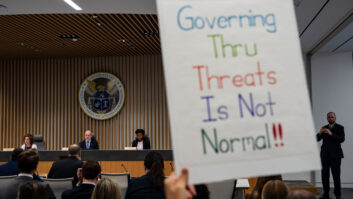Take care with how you approach time brokerage agreements … and don’t be in too much of a hurry.
The commission’s multiple ownership rule may cost a licensee $20,000 for having attributable ownership in too many stations in a market. A killer quote in the ruling: “Business expedience is not synonymous with the public interest.”
The case involves stations in the Syracuse, N.Y., metro. In March 2016, FoxFur Communications and its sibling company WOLF Radio entered into an exchange agreement with Family Life Ministries, whereby FoxFur would assign FM signals WCIS, WCIO and W252AC to Family, while Family would assign FM station WNDR to FoxFur. On the same date, FoxFur and Family entered into a time brokerage agreement, in which Family would broker all of the the programming for WCIS and WCIO, and FoxFur would broker the programming for WNDR.
Eleven days later, FoxFur and Family filed an application with the commission seeking consent to assign the licenses in this way: WCIS and W252AC from FoxFur to Family; WCIO from WOLF to Family; and WNDR from Family to FoxFur.
The first hiccup for FoxFur arises when one considers location. All of the stations are in the Syracuse, N.Y., Nielsen audio metro market; FCC rules stipulate that in this metro, one party may own or hold attributable interests in up to seven radio stations, with no more than four in the same service.
While FoxFur held attributable interests in seven stations (four FM and three AM) in the Syracuse Metro before the TBA, the agreement resulted in FoxFur having an attributable interest in eight — five of which are FMs — in violation of local radio ownership rule, Section 73.3555.
Aware of this issue, FoxFur requested a temporary waiver of the rules while the parties would await action on the assignment applications, according to an FCC summary. It pointed out that the commission had granted 12-month temporary waivers for similar situations. FoxFur also said that the reassignment would be a boon to the area in because it would bring two new FM voices to the Syracuse market, and listeners would have access to Family Life Ministry programming.
The commission did not agree. It said the TBA was entered into by FoxFur and Family before they filed the assignment applications, giving FoxFur a cognizable interest in eight stations, including five FMs. It didn’t help that in the WNDR TBA, the FCC said, that FoxFur inaccurately represented that the agreement did not violate the multiple ownership rules, and then followed up by requesting a temporary waiver of them. FoxFur chose not to wait for the commission to act on its waiver request but began programming WNDR in clear violation of the rules, the commission decided.
“Business expedience is not synonymous with the public interest,” the FCC wrote. “Regardless of whether or not a waiver … is warranted in this case, we cannot countenance FoxFur’s unorthodox approach to waivers. FoxFur’s attempt to legitimize its actions by merely submitting a waiver request does not absolve it of this transgression or nullify the rule violation.”
In assessing the penalty, the commission said FoxFur was well aware that commencement of the TBA for WNDR gave it interest in eight radio stations in the metro. The FCC labeled that a willful violation; given the duration of the violation, from March 28, 2016, until the present, the violation was considered substantial.
So the commission handed FoxFur a $20,000 fine; denied the FoxFur/WOLF Radio waiver request; and outright dismissed the FoxFur, WOLF Radio and Family Life Ministries assignment applications.
FoxFur and WOLF Radio must pay within 30 days or file an appeal seeking reduction or cancellation.







